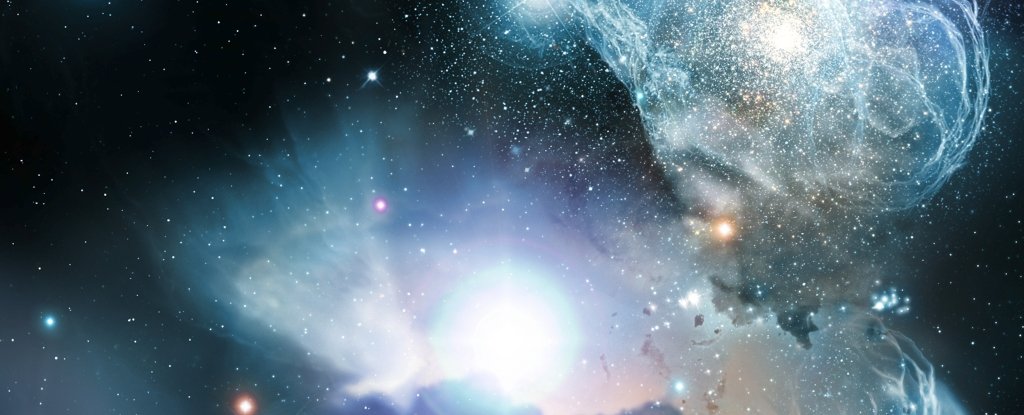Welcome to DU!
The truly grassroots left-of-center political community where regular people, not algorithms, drive the discussions and set the standards.
Join the community:
Create a free account
Support DU (and get rid of ads!):
Become a Star Member
Latest Breaking News
General Discussion
The DU Lounge
All Forums
Issue Forums
Culture Forums
Alliance Forums
Region Forums
Support Forums
Help & Search
Science
Related: About this forumAstronomers Have Detected 83 Black Holes in The Early Universe, Challenging Cosmology

MICHELLE STARR 19 MAR 2019
Astronomers have just found 83 quasars, powered by supermassive black holes and dating back to the infancy of the Universe, when it was less than 10 percent of its current age.
This discovery reveals that such objects were more common at the dawn of time than we thought, and challenges our entire cosmological model.
Quasars are among the brightest objects in the Universe, extremely luminous galactic cores powered by actively feeding supermassive black holes. As material swirls around the black hole, its friction generates such intense radiation that it can be seen, even from billions of light-years away.
There's just one big problem. We think we know how black holes form - they are the collapsed cores of massive stars. And supermassive black holes can have up to billions of times the mass of the Sun.
More:
https://www.sciencealert.com/there-shouldn-t-be-supermassive-black-holes-in-the-early-universe-astronomers-have-just-found-83
InfoView thread info, including edit history
TrashPut this thread in your Trash Can (My DU » Trash Can)
BookmarkAdd this thread to your Bookmarks (My DU » Bookmarks)
2 replies, 694 views
ShareGet links to this post and/or share on social media
AlertAlert this post for a rule violation
PowersThere are no powers you can use on this post
EditCannot edit other people's posts
ReplyReply to this post
EditCannot edit other people's posts
Rec (2)
ReplyReply to this post
2 replies
 = new reply since forum marked as read
Highlight:
NoneDon't highlight anything
5 newestHighlight 5 most recent replies
= new reply since forum marked as read
Highlight:
NoneDon't highlight anything
5 newestHighlight 5 most recent replies
Astronomers Have Detected 83 Black Holes in The Early Universe, Challenging Cosmology (Original Post)
Judi Lynn
Mar 2019
OP
83 Gargantuan Black Holes Spotted Guzzling Down Dinner at the Edge of the Universe
Judi Lynn
Mar 2019
#2
PoindexterOglethorpe
(25,809 posts)1. That's interesting.
I will need to discuss this with My Son the Astronomer.
Right now he's in Switzerland at a Radial Velocity Conference. Radial Velocity is one of the ways used to locate exo-planets.
But he does tend to know a fair amount about other related astronomy things.
Judi Lynn
(160,415 posts)2. 83 Gargantuan Black Holes Spotted Guzzling Down Dinner at the Edge of the Universe
By Stephanie Pappas 5 hours ago

An artist's conception of a quasar surrounding a supermassive black hole, which has a mass many times that of Earth's sun. Although nothing that falls into the black hole can escape, its massive gravity accelerates an "accretion disk" of luminous particles and gases around it. (Image: © Yoshiki Matsuoka)
Astronomers have discovered 83 supermassive black holes birthed by the universe in its infancy.
More precisely, the researchers have detected quasars, or huge, luminous disks of gases and dust that surround supermassive black holes. (The black holes themselves emit no light or energy, of course, though friction from the matter that swirls around and ultimately into a black hole's "mouth" does spit out immense light.) The quasars and their central black holes are 13 billion light-years away from Earth, meaning scientists are seeing the objects now as they appeared only 800 million years after the universe formed.
Prior to the new discovery, which was made using Japan's Subaru Telescope, only 17 supermassive black holes were known from the region surveyed. [Stephen Hawking's Most Far-Out Ideas About Black Holes]
Quasars are the brightest objects in the universe, and they are found only around black holes that are millions of times the mass of Earth's sun. The most distant quasar ever found was detected by the light it gave off only 690 million years after the Big Bang. Of the 83 newfound quasars, the most distant one is 13.05 billion light-years away from us. That means its light started its journey to the telescope lens within the universe's first billion years. This quasar is tied with an earlier discovery as the second-most distant quasar ever found.
More:
https://www.space.com/83-supermassive-black-holes-discovered.html